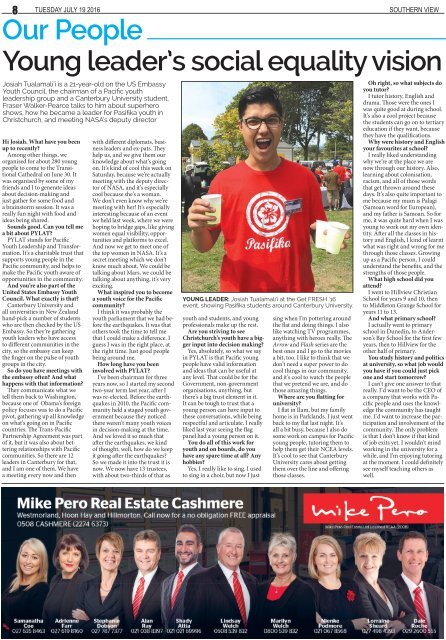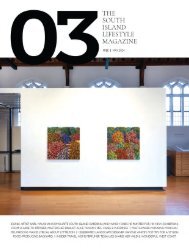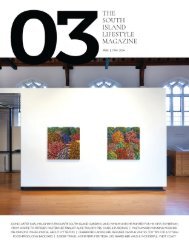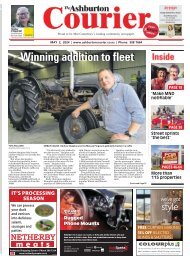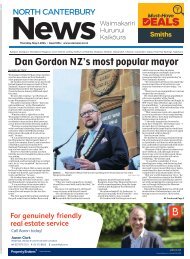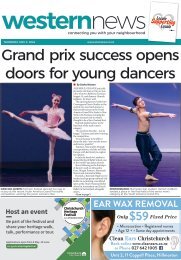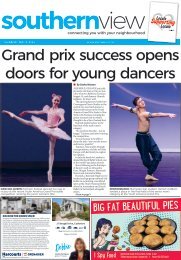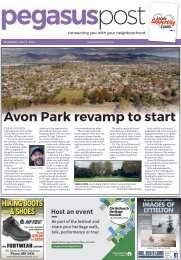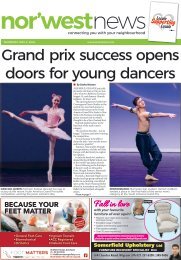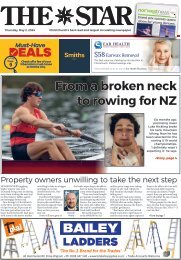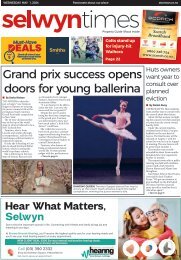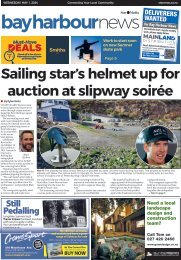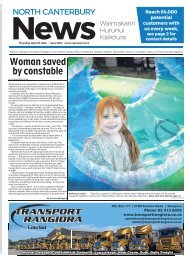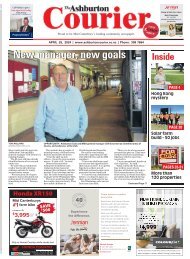Southern View: July 19, 2016
Create successful ePaper yourself
Turn your PDF publications into a flip-book with our unique Google optimized e-Paper software.
8<br />
Tuesday <strong>July</strong> <strong>19</strong> <strong>2016</strong><br />
Our People<br />
SOUTHERN VIEW<br />
Young leader’s social equality vision<br />
Josiah Tualamali’i is a 21-year-old on the US Embassy<br />
Youth Council, the chairman of a Pacific youth<br />
leadership group and a Canterbury University student.<br />
Fraser Walker-Pearce talks to him about superhero<br />
shows, how he became a leader for Pasifika youth in<br />
Christchurch, and meeting NASA’s deputy director<br />
Hi Josiah. What have you been<br />
up to recently?<br />
Among other things, we<br />
organised for about 280 young<br />
people to come to the Transitional<br />
Cathedral on June 30. It<br />
was organised by some of my<br />
friends and I to generate ideas<br />
about decision-making and<br />
just gather for some food and<br />
a brainstorm session. It was a<br />
really fun night with food and<br />
ideas being shared.<br />
Sounds good. Can you tell me<br />
a bit about PYLAT?<br />
PYLAT stands for Pacific<br />
Youth Leadership and Transformation.<br />
It’s a charitable trust that<br />
supports young people in the<br />
Pacific community, and helps to<br />
make the Pacific youth aware of<br />
opportunities in the community.<br />
And you’re also part of the<br />
United States Embassy Youth<br />
Council. What exactly is that?<br />
Canterbury University and<br />
all universities in New Zealand<br />
hand-pick a number of students<br />
who are then checked by the US<br />
Embassy. So they’re gathering<br />
youth leaders who have access<br />
to different communities in the<br />
city, so the embassy can keep<br />
the finger on the pulse of youth<br />
groups in the city.<br />
So do you have meetings with<br />
the embassy often? And what<br />
happens with that information?<br />
They communicate what we<br />
tell them back to Washington,<br />
because one of Obama’s foreign<br />
policy focuses was to do a Pacific<br />
pivot, gathering up all knowledge<br />
on what’s going on in Pacific<br />
countries. The Trans-Pacific<br />
Partnership Agreement was part<br />
of it, but it was also about bettering<br />
relationships with Pacific<br />
communities. So there are 12<br />
leaders in Canterbury for that,<br />
and I am one of them. We have<br />
a meeting every now and then<br />
with different diplomats, business<br />
leaders and ex-pats. They<br />
help us, and we give them our<br />
knowledge about what’s going<br />
on. It’s kind of cool this week on<br />
Saturday, because we’re actually<br />
meeting with the deputy director<br />
of NASA, and it’s especially<br />
cool because she’s a woman.<br />
We don’t even know why we’re<br />
meeting with her! It’s especially<br />
interesting because of an event<br />
we held last week, where we were<br />
hoping to bridge gaps, like giving<br />
women equal visibility, opportunities<br />
and platforms to excel.<br />
And now we get to meet one of<br />
the top women in NASA. It’s a<br />
secret meeting which we don’t<br />
know much about. We could be<br />
talking about Mars, we could be<br />
talking about anything, it’s very<br />
exciting.<br />
What inspired you to become<br />
a youth voice for the Pacific<br />
community?<br />
I think it was probably the<br />
youth parliament that we had before<br />
the earthquakes. It was that<br />
others took the time to tell me<br />
that I could make a difference. I<br />
guess I was in the right place, at<br />
the right time. Just good people<br />
being around me.<br />
How long have you been<br />
involved with PYLAT?<br />
I’ve been chairman for three<br />
years now, so I started my second<br />
two-year term last year, after I<br />
was re-elected. Before the earthquakes<br />
in 2010, the Pacific community<br />
held a staged youth government<br />
because they noticed<br />
there weren’t many youth voices<br />
in decision-making at the time.<br />
And we loved it so much that<br />
after the earthquakes, we kind<br />
of thought, well, how do we keep<br />
it going after the earthquakes?<br />
So we made it into the trust it is<br />
now. We now have 13 trustees,<br />
with about two-thirds of that as<br />
YOUNG LEADER: Josiah Tualamali’i at the Get FRESH ‘16<br />
event, showing Pasifika students around Canterbury University.<br />
youth and students, and young<br />
professionals make up the rest.<br />
Are you striving to see<br />
Christchurch’s youth have a bigger<br />
input into decision making?<br />
Yes, absolutely, so what we say<br />
in PYLAT is that Pacific young<br />
people have valid information<br />
and ideas that can be useful at<br />
any level. That could be for the<br />
Government, non-government<br />
organisations, anything, but<br />
there’s a big trust element in it.<br />
It can be tough to trust that a<br />
young person can have input to<br />
these conversations, while being<br />
respectful and articulate. I really<br />
liked last year seeing the flag<br />
panel had a young person on it.<br />
You do all of this work for<br />
youth and on boards, do you<br />
have any spare time at all? Any<br />
hobbies?<br />
Yes, I really like to sing. I used<br />
to sing in a choir, but now I just<br />
sing when I’m pottering around<br />
the flat and doing things. I also<br />
like watching TV programmes,<br />
anything with heroes really. The<br />
Arrow and Flash series are the<br />
best ones and I go to the movies<br />
a bit, too. I like to think that we<br />
don’t need a super power to do<br />
cool things in our community,<br />
and it’s cool to watch the people<br />
that we pretend we are, and do<br />
those amazing things.<br />
Where are you flatting for<br />
university?<br />
I flat in Ilam, but my family<br />
home is in Parklands. I just went<br />
back to my flat last night. It’s<br />
all a bit busy, because I also do<br />
some work on campus for Pacific<br />
young people, tutoring them to<br />
help them get their NCEA levels.<br />
It’s cool to see that Canterbury<br />
University cares about getting<br />
them over the line and offering<br />
those classes.<br />
Oh right, so what subjects do<br />
you tutor?<br />
I tutor history, English and<br />
drama. Those were the ones I<br />
was quite good at during school.<br />
It’s also a cool project because<br />
the students can go on to tertiary<br />
education if they want, because<br />
they have the qualifications.<br />
Why were history and English<br />
your favourites at school?<br />
I really liked understanding<br />
why we’re at the place we are<br />
now through our history. Also,<br />
learning about colonisation,<br />
racism, and all of those words<br />
that get thrown around these<br />
days. It’s also quite important to<br />
me because my mum is Palagi<br />
(Samoan word for European),<br />
and my father is Samoan. So for<br />
me, it was quite hard when I was<br />
young to work out my own identity.<br />
After all the classes in history<br />
and English, I kind of learnt<br />
what was right and wrong for me<br />
through those classes. Growing<br />
up as a Pacific person, I could<br />
understand the benefits, and the<br />
strengths of those people.<br />
What high school did you<br />
attend?<br />
I went to Hillview Christian<br />
School for years 9 and 10, then<br />
to Middleton Grange School for<br />
years 11 to 13.<br />
And what primary school?<br />
I actually went to primary<br />
school in Dunedin, to Anderson’s<br />
Bay School for the first few<br />
years, then to Hillview for the<br />
other half of primary.<br />
You study history and politics<br />
at university, so what job would<br />
you have if you could just pick<br />
one and start tomorrow?<br />
I can’t give one answer to that<br />
really. I’d want to be the CEO of<br />
a company that works with Pacific<br />
people and uses the knowledge<br />
the community has taught<br />
me. I’d want to increase the participation<br />
and involvement of the<br />
community. The only problem<br />
is that I don’t know if that kind<br />
of job exits yet. I wouldn’t mind<br />
working in the university for a<br />
while, and I’m enjoying tutoring<br />
at the moment. I could definitely<br />
see myself teaching others as<br />
well.


